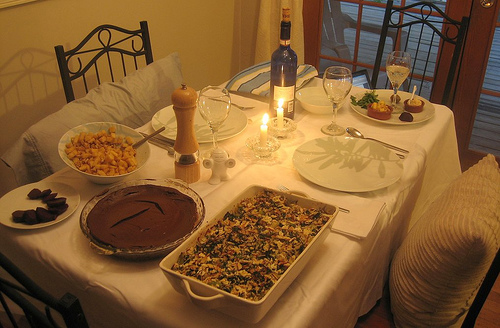Just because I’m fascinated by the emerging church movement, the call to new life, and the need for the church to constantly tailor its message creatively to be coherent and relevant in our context doesn’t mean I’m anti-tradition.
The church must be an active force in maintaining tradition.
By tradition, however, I do not mean a cultural bastion against the forces of change, a preservation of nostalgia, or a settling into comfortable, unchallenging, backwaters that exclude those who are not like us.
Tradition is the passing on and remembering together of things that should never be forgotten.
The Passover Seder is a prime example. It arises out of the book of Exodus, in which a major theme is that trouble comes from failed memory.
The Israelites are repeatedly saved by spectacular acts of God — the plagues, the parting of the Red Sea, the appearance of manna in the desert. Yet, within days of these once-in-a-lifetime marvels, each so wondrous that you can’t imagine anyone could ever forget it, the people forget these things ever happened. They complain. They panic. They get nostalgic for a false memory of the good old days of slavery. The appearance of manna, only recently greeted as a miracle of salvation, becomes a surly “is this all we get?”
Moses goes up to the mountain to firm up the covenant that the people to which the people have eagerly agreed. He’s barely out of sight when the people start to forget who Moses is, much less what this covenant is all about.
Memory is necessary for faith. The Passover Seder is the memory aid prescribed by Exodus. The unleavened bread, the lamb, the bitter herbs, and the wine all serve the task that is repeated time and again in the Hebrew Bible: Remember when you were slaves …
Remember this story of how God rescued you from the pit of oppression. Of how God could not abide injustice. Of how God gave you the gift of freedom. And just as important, remember how it felt when you were on the receiving end. Remember what it felt like to be oppressed so that you do not do it to others.
Remember, remember, remember.
That memory aid has been tremendously effective in shaping Judeo-Christian faith throughout the centuries. The tradition is still practiced today, not just for the sake of doing things “the way it was when I was a kid.” It’s done to remember that which should not be forgotten.
That’s what a tradition is supposed to do.
Tradition is not the perpetuation of that which makes us feel cozy and comfortable in surroundings that are familiar to us, yet foreign and uninviting to the stranger. It is not that which reminds me of the good old days when I was young, whether or not that has any relevance to someone not of my generation. Tradition is not playing a certain style of music or using a certain style of liturgy or employing a certain style of architecture.
Christian traditions exist to help us remember things that should never be forgotten: the grace of God, the life and passion of Christ, the promises of forgiveness and new life. They help us remember who God is.
We remember these things through the sacraments of baptism and communion, and through the reading of the Word.
Next week I will talk about the special role of the preacher in the preservation of tradition, in reviving and reliving memories of that which should not be forgotten.

